ICO require Wirral Council to release 94 page draft agreement with Nicklaus Joint Venture Group Limited about Hoylake Golf Resort
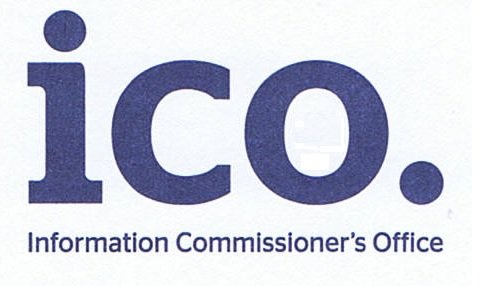
Updated 27.2.18 with an amendment to paragraph 3 of the decision notice following First-tier Tribunal (information rights) case EA/2017/0191.
Edited 10.8.17 by JB to include text of decision notice below images of pages
ICO have required Wirral Council to disclose 94 pages of a draft development agreement between itself and the Nicklaus Joint Venture Group Limited in respect of the proposed golf course, hotel and residential property in Hoylake. This project is known as the Hoylake Golf Resort and the proposed development involves the sale of and leasing of Wirral Council owned land to the developer.
Wirral Council have 35 calendar days (from the 7th August 2017) to provide the information or alternatively they can appeal ICO’s decision to the First-tier Tribunal (Information Rights) within 28 days.
ICO ruled that a further 29 pages of legal advice that Wirral Council received from Pinsent Masons about the Hoylake Golf Resort project did not need to be disclosed.
You can read the full 14 page decision notice (FER0672223) below.
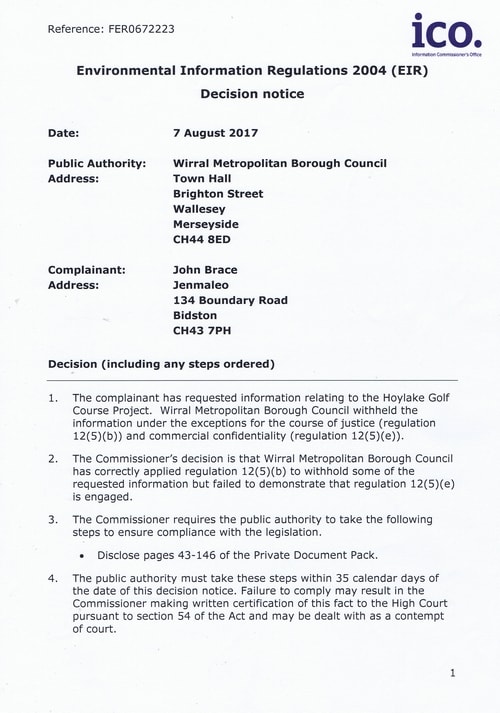
Reference: FER0672223
Environmental Information Regulations 2004 (EIR)
Decision notice
| Date: | 7 August 2017 |
| Public Authority: | Wirral Metropolitan Borough Council |
| Address: | Town Hall |
| Brighton Street | |
| Wallasey | |
| Merseyside | |
| CH44 8ED | |
| Complainant: | John Brace |
| Address: | Jenmaleo |
| Jenmaleo | |
| 134 Boundary Road | |
| Bidston | |
| CH43 7PH | |
Decision (including any steps ordered)
- The complainant has requested information relating to the Hoylake Golf Resort Project. Wirral Metropolitan Borough Council withheld the information under the exceptions for the course of justice (regulation 12(5)(b)) and commercial confidentiality (regulation 12(5)(e)).
- The Commissioner’s decision is that Wirral Metropolitan Borough Council has correctly applied regulation 12(5)(b) to withhold some of the requested information but failed to demonstrate that regulation 12(5)(e) is engaged.
The Commissioner requires the public authority to take the following steps to ensure compliance with the legislation.● Disclose pages 43-146 of the Private Document Pack.
The Tribunal requires Wirral Metropolitan Council to take the following steps to ensure compliance with the legislation –
Disclose the Amended Annotated Development Agreement at pages 256 – 351 of the Closed Bundle prepared for the appeal hearing, save the passages annotated in green and any marginal green notes, which may be withheld. The Commissioner’s order at paragraph 2 of the Decision Notice stands.
- The public authority must take these steps within 35 calendar days of the date of this decision notice. Failure to comply may result in the Commissioner making written certification of this fact to the High Court pursuant to section 54 of the Act and may be dealt with as a contempt of court.
1
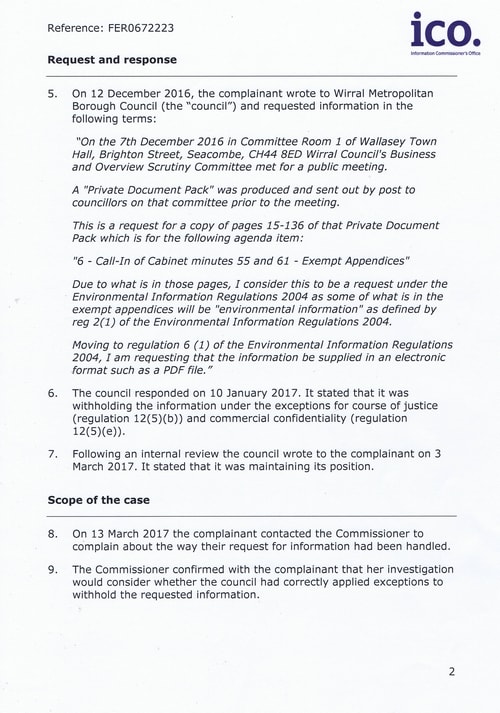
Reference: FER0672223
Request and response
- On 12 December 2016, the complainant wrote to Wirral Metropolitan Borough Council (the “council”) and requested information in the following terms:
“On the 7th December 2016 in Committee Room 1 of Wallasey Town Hall, Brighton Street, Seacombe, CH44 8ED Wirral Council’s Business and Overview Scrutiny Committee met for a public meeting.
A “Private Document Pack” was produced and sent out by post to councillors on that committee prior to the meeting.
This is a request for a copy of pages 15-136 of that Private Document Pack which is for the following agenda item:
“6 – Call-In of Cabinet minutes 55 and 61 – Exempt Appendices”
Due to what is in those pages, I consider this to be a request under the Environmental Information Regulations 2004 as some of what is in the exempt appendices will be “environmental information” as defined by regulation 2(1) of the Environmental Information Regulations 2004.
Moving to regulation 6(1) of the Environmental Information Regulations 2004, I am requesting that the information be supplied in an electronic format such as a PDF file.”
- The Council responded on 10 January 2017. It stated that it was withholding the information under the exceptions for course of justice (regulation 12(5)(b) and commercial confidentiality (regulation 12(5)(e)).
- Following an internal review the council wrote to the complainant on 3 March 2017. It stated that it was maintaining its position.
Scope of the case
- On 13 March 2017 the complainant contacted the Commissioner to complain about the way their request for information had been handled.
- The Commissioner confirmed with the complainant that her investigation would consider whether the council had correctly applied exceptions to withhold the requested information.
2
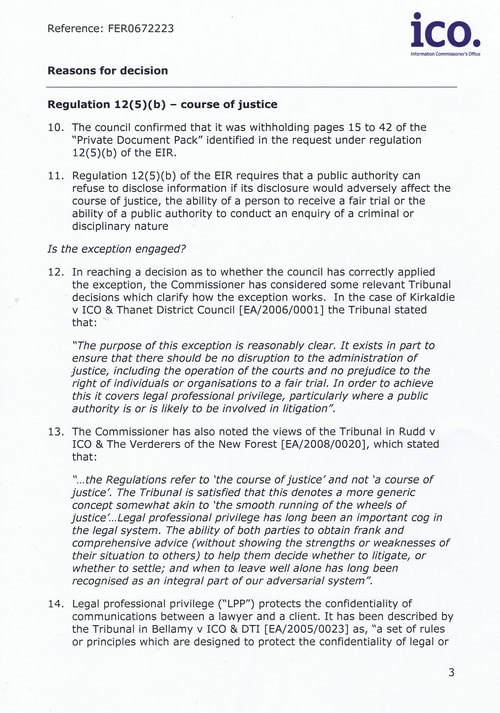
Reference: FER0672223
Reasons for decision
Regulation 12(5)(b) – course of justice
- The council confirmed that it was withholding pages 15 to 42 of the “Private Document Pack” identified in the request under Regulation 12(5)(b) of the EIR.
- Regulation 12(5)(b) of the EIR requires that a public authority can refuse to disclose information if its disclosure would adversely affect the course of justice, the ability of a person to receive a fair trial or the ability of a public authority to conduct an enquiry of a criminal or disciplinary nature
Is the exception engaged?
- In reaching a decision as to whether the council had correctly applied the exception, the Commissioner had considered some relevant Tribunal decisions which clarify how the exception works. In the case of Kirkaldie v ICO & Thanet District Council [EA/2006/0001] the Tribunal stated that:
“The purpose of this exception is reasonably clear. It exists in part to ensure that there should be no disruption to the administration of justice, including the operation of the courts and no prejudice to the rights of individuals or organisations to a fair trial. In order to achieve this it covers legal professional privilege, particularly where a public authority is or is likely to be involved in litigation”.
- The Commissioner has also noted the views of the Tribunal in Rudd v ICO & The Verderers of the New Forest [EA/2008/0020], which stated that:
“…the Regulations refer to the ‘course of justice’ and not ‘a course of justice’. The Tribunal is satisfied that this denotes a more generic concept somewhat akin to the ‘smooth running of the wheels of justice’…Legal professional privilege has long been an important cog in the legal system. The ability of both parties to obtain frank and comprehensive advice (without showing the strengths or weaknesses of their situation to others) to help them decide whether to litigate, or whether to settle; and when to leave well alone has long been recognised as an integral part of our adversarial system”.
- Legal professional privilege (“LPP”) protects the confidentiality of communications between a lawyer and a client. It has been described by the Tribunal in Bellamy v ICO & DTI [EA/2005/0023] as, “a set of rules or principles which are designed to protect the confidentiality of legal or
3
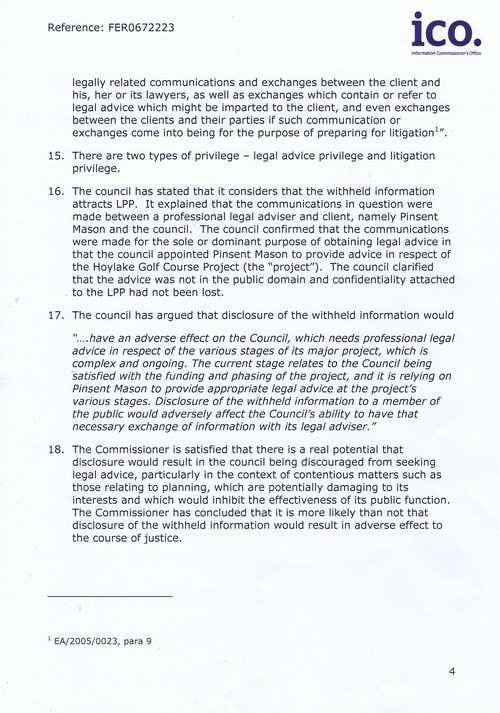
Reference: FER0672223
- legally related communications and exchanges between the client and his, her or its lawyers, as well as exchanges which contain or refer to legal advice which may be imparted to the client, and even exchanges between the clients and their parties if such communication or exchanges come into being for the purpose of preparing for litigation1”.
- There are two types of privilege – legal advice privilege and litigation privilege.
- The council has stated that the withheld information attracts LPP. It explained that the communications in question were made between a professional legal adviser and client, namely Pinsent Mason and the council. The council confirmed that the communications were made for the sole or dominant purpose of obtaining legal advice in that the council appointed Pinsent Mason to provide advice in respect of the Hoylake Golf Resort Project (the “project”). The council clarified that the advice was not in the public domain and confidentiality attached to the LPP had not been lost.
- The council has argued that disclosure of the withheld information would
“….have an adverse effect on the Council, which needs professional legal advice in respect of the various stages of its major project, which is complex and ongoing. The current stage relates to the Council being satisfied with the funding and phasing of the project, and it is relying on Pinsent Mason to provide appropriate legal advice at the project’s various stages. Disclosure of the withheld information to a member of the public would adversely affect the Council’s ability to have that necessary exchange of information with its legal adviser.”
- The Commissioner is satisfied that there is a real potential that disclosure would result in the council being discouraged from seeking legal advice, particularly in the context of contentious matters such as those relating to planning, which are potentially damaging to its interests and would inhibit the effectiveness of its public function. The Commissioner has concluded that it is more likely that not that disclosure of the withheld information would result in adverse effect to the course of justice.
4
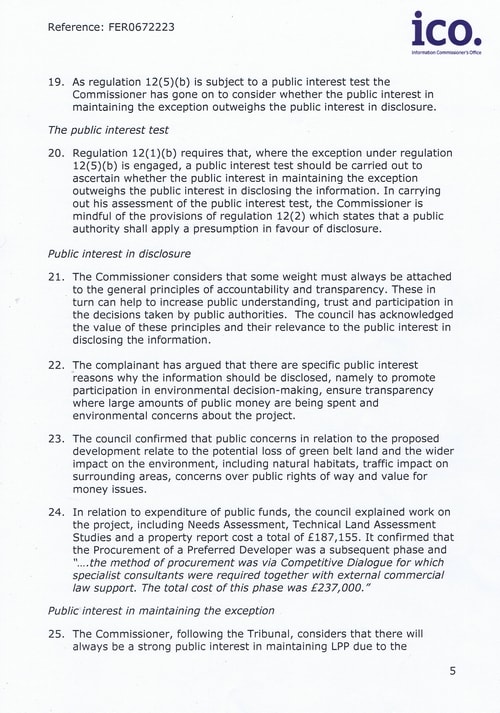
Reference: FER0672223
- As regulation 12(5)(b) is subject to a public interest test the Commissioner has gone on to consider whether the public interest in maintaining the exception outweighs the public interest in disclosure.
The public interest test
- Regulation 12(1)(b) requires that, where the exception under regulation 12(5)(b) is engaged, a public interest test should be carried out to ascertain whether the public interest in maintaining the exception outweighs the public interest in disclosing the information. In carrying out his assessment of the public interest test, the Commissioner is mindful of the provisions of regulation 12(2) which states that a public authority shall apply a presumption in favour of disclosure.
Public interest in disclosure
- The Commissioner considers that some weight must always be attached to the general importance of accountability and transparency. These in turn can help to increase public understanding, trust and participation in the decisions taken by public authorities. The council has acknowledged the value of these principles and their relevance to the public interest in disclosing the information.
- The complainant has argued that there are specific public interest reasons why the information should be disclosed, namely to promote participation in environmental decision–making, ensure transparency where large amounts of public money are being spent and environmental concerns about the project.
- The council confirmed that public concerns in relation to the proposed development relate to the potential loss of green belt land and the wider impact on the environment, including natural habitats, traffic impact on surrounding areas, concerns over public rights of way and value for money issues.
- In relation to expenditure of public funds, the council explained work on the project, including Needs Assessment, Technical Land Assessment Studies and a property report cost a total of £187,155. It confirmed that “….the method of procurement was via Competitive Dialogue for which specialist consultants were required together with external commercial law support. The total cost of this phase was £237,000.”
Public interest in maintaining the exception
- The Commissioner, following the Tribunal, considers there will always be a strong public interest in maintaining LPP due to the
5
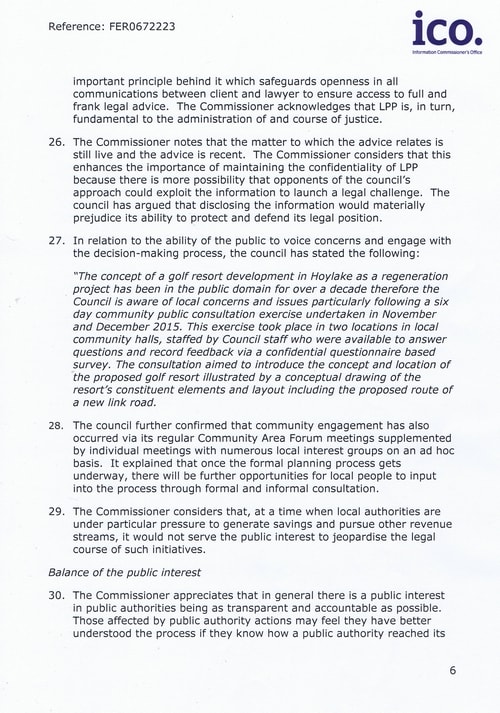
Reference: FER0672223
- important principle behind it which safeguards openness in all communications between client and lawyer to ensure access to full and frank legal advice. The Commissioner acknowledges that LPP is, in turn, fundamental to the administration of and course of justice.
- The Commissioner notes that the matter to which the advice relates to is still live and the advice is recent. The Commissioner considers that this enhances the importance of maintaining the confidentiality of LPP because there is more possibility that opponents of the council’s approach could exploit the information to launch a legal challenge. The council has argued that disclosing the information would materially prejudice its ability to protect and defend its legal position.
- In relation to the ability of the public to voice concerns and engage with the decision–making process, the council has stated the following:
“The concept of a golf resort development in Hoylake as a regeneration project has been in the public domain for over a decade therefore the Council is aware of local concerns and issues particularly following a six day community public consultation exercise undertaken in November and December 2016. This exercise took place in two locations in local community halls, staffed by Council staff who were available to answer questions and record feedback via a confidential questionnaire based survey. The consultation aimed to introduce the concept and location of the proposed golf resort illustrated by a conceptual drawing of the resort’s constituent elements and layout including the proposed route of a new link road.
- The council further confirmed that community engagement has also occurred via its regular Community Area Forum meetings supplemented by individual meetings with numerous local interest groups on an ad hoc basis. It explained that once the formal planning process gets underway, there will be further opportunities for local people to input into the process through formal and informal consultation.
- The Commissioner considers that, at a time when local authorities are under particular pressure to generate savings and pursue other revenue streams, it would not serve the public interest to jeopardise the legal course of such initiatives.
Balance of the public interest
- The Commissioner appreciates that in general there is a public interest in public authorities being as transparent and as accountable as possible. Those affected by public authority actions feel they have better understood the process if they know how a public authority reached its
6
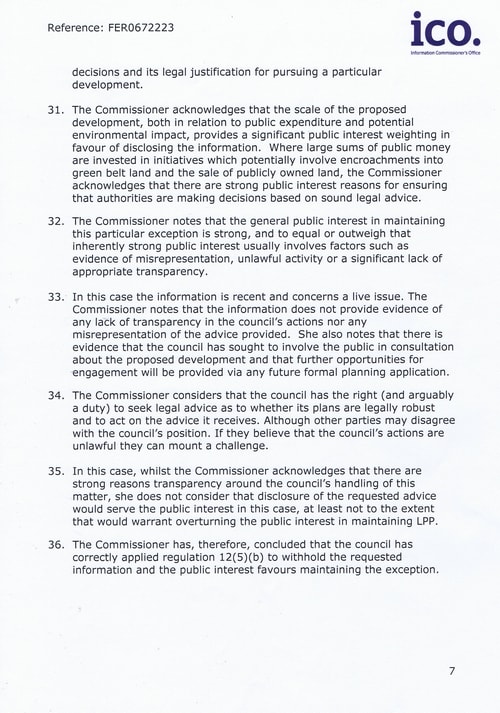
Reference: FER0672223
- decisions and its legal justification for pursuing a particular development.
- The Commissioner acknowledges that the scale of the proposed development, both in relation to public expenditure and potential environmental impact, provides a significant public interest weighting in favour of disclosing the information. Where large sums of public money are invested in initiatives which potentially involve encroachments into green belt land and the sale of publicly owned land, the Commissioner acknowledges that there are strong public interest reasons for ensuring that authorities are making decisions based on sound legal advice.
- The Commissioner notes that the general public interest in maintaining this particular exception is strong, and to equal or outweigh that inherently strong public interest usually involves factors such as evidence of misrepresentation, unlawful activity or a significant lack of appropriate transparency.
- In this case the information is recent and concerns a live issue. The Commissioner notes that the information does not provide evidence of any lack of transparency in the council’s actions nor any misrepresentation of the advice provided. She also notes that there is evidence that the council has sought to involve the public in consultation about the proposed development and that further opportunities for engagement will be provided via any future formal planning application.
- The Commissioner considers that the council has the right (and arguably a duty) to seek legal advice as to whether its plans are legally robust and to act on the advice it receives. Although other parties may disagree with the council’s position. If they believe that the council’s actions are unlawful they can mount a challenge.
- In this case, whilst the Commissioner acknowledges that there are strong reasons transparency around the council’s handling of this matter, she does not consider that disclosure of the requested advice would serve the public interest in this case, at least not to the extent that would warrant overturning the public interest in maintaining LPP.
- The Commissioner has, therefore, concluded that the council has correctly applied regulation 12(5)(b) to withhold the requested information and the public interest favours maintaining the exception.
7
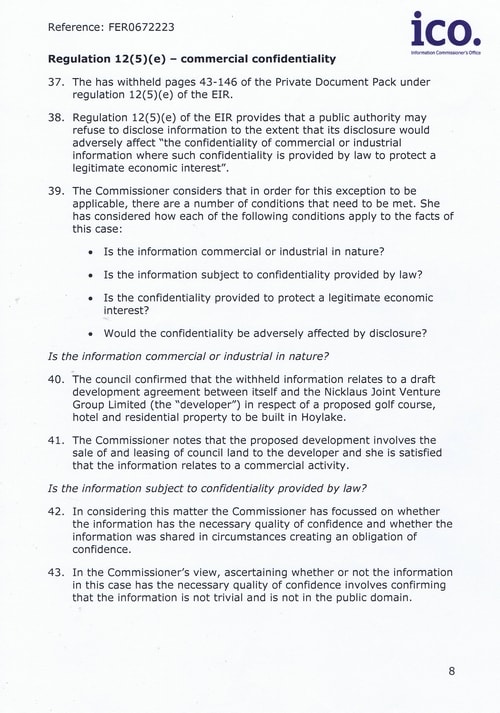
Reference: FER0672223
Regulation 12(5)(e) – commercial confidentiality
- The has withheld pages 43-146 of the Private Document Pack under regulation 12(5)(e) of the EIR.
- Regulation 12(5)(e) of the EIR provides that a public authority may refuse to disclose information to the extent that its disclosure would adversely affect “the confidentiality of commercial or industrial information where such confidentiality is provided by law to protect a legitimate economic interest”.
- The Commissioner considers that in order for this exception to be applicable, there are a number of conditions that need to be met. She has considered how each of the following conditions apply to the facts of this case:
● Is the information commercial or industrial in nature?
● Is the information subject to confidentiality provided by law?
● Is the confidentiality provided to protect a legitimate economic interest?
● Would the confidentiality be adversely affected by disclosure?
Is the information commercial or industrial in nature?
- The council confirmed that the withheld information relates to a draft development agreement between itself and the Nicklaus Joint Venture Group Limited (the “developer”) in respect of a proposed golf course, hotel and residential property to be built in Hoylake.
- The Commissioner notes that the proposed development involves the sale of and leasing of council land to the developer and she is satisfied that the information relates to a commercial activity.
Is the information subject to confidentiality provided by law?
- In considering this matter the Commissioner has focussed on whether the information has the necessary quality of confidence and whether the information was shared in circumstances creating an obligation of confidence.
- In the Commissioner’s view, ascertaining whether or not the information in this case has the necessary quality of confidence involves confirming that the information is not trivial and is not in the public domain.
8
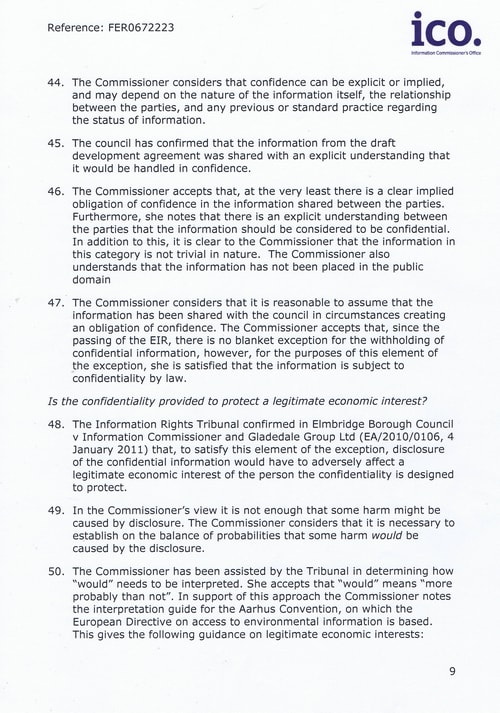
Reference: FER0672223
- The Commissioner considers that confidence can be explicit or implied, and may depend on the nature of the information itself, the relationship between the parties, and any previous or standard practice regarding the status of information.
- The council has confirmed that the information from the draft development agreement was shared with an explicit understanding that it would be handled in confidence.
- The Commissioner accepts that, at the very least there is a clear implied obligation of confidence in the information shared between the parties. Furthermore, she notes that there is an explicit understanding between the parties that the information should be considered to be confidential. In addition to this, it is clear to the Commissioner that the information in this category is not trivial in nature. The Commissioner also understands that the information has not been placed in the public domain
- The Commissioner considers that it is reasonable to assume that the information has been shared with the council in circumstances creating an obligation of confidence. The Commissioner accepts that, since the passing of the EIR, there is no blanket exemption for the withholding of confidential information, however, for the purposes of this element of the exception, she is satisfied that the information us subject to confidentiality by law.
- The Information Rights Tribunal confirmed in Elmbridge Borough Council v Information Commissioner and Gladedale Group Ltd (EA/2010/0106, 4 January 2011) that, to satisfy this element of the exception, disclosure of the confidential information would have to adversely affect a legitimate economic interest of the person the confidentiality is designed to protect.
- In the Commissioner’s view it is not enough that some harm might be caused by disclosure. The Commissioner considers that is it necessary to establish on the balance of probabilities that some harm would be caused by disclosure.
- The Commissioner has been assisted by the Tribunal in determining how “would” needs to be interpreted. She accepts that “would” means “more probably than not”. In support of this approach the Commissioner notes the interpretation guide for the Aarhus Convention, on which the European Directive on access to environmental information is based. This gives the following guidance on legitimate economic interests:
9

Reference: FER0672223
- “Determine harm. Legitimate economic interest also implies that the exception may be invoked only if disclosure would significantly damage the interest in question and assist its competitors.”
- The council has argued that disclosure of the information would adversely affect its own legitimate economic interest and those of the developer.
- In relation to the nature of the adverse effects, the council stated
“At the date of the request, the information was highly sensitive and continues to be highly sensitive. Economic development is one of the functions of the Council. Disclosure of highly sensitive commercial information would adversely affect the Council’s ability to negotiate major projects and lead to reputational damage. Developers such as the Nicklaus Joint Venture Group Limited would be less likely to participate in major projects such as the Hoylake Golf Club Project, if they thought commercially sensitive information would be disclosed to a member of the public at this or any stage of the project.”
- The council further argued that disclosure of the information would:
“….significantly damage the legitimate economic interest of both the Council and the Nicklaus Joint Venture Group Limited and assist its competitors who would get access to commercially valuable information.”
Conclusions
- In relation to the adverse affects to its own legitimate economic interests, the council has essentially argued that the outcome of disclosing the information would be future reluctance by prospective third parties from engaging with the council because of the possibility that their commercial information might be disclosed. In other words, the council would experience difficulty engaging third parties in future large developments or partnership opportunities, harming its ability to effectively pursue its legitimate economic interests.
- Firstly, the Commissioner considers that, since the coming into force of the EIR, public authorities entering into contractual arrangements with third parties should make it clear that any relevant information held can be subject to disclosure in response to a request for information. Third parties should, therefore, be aware of the possibility that “commercial” information might be disclosed.
10
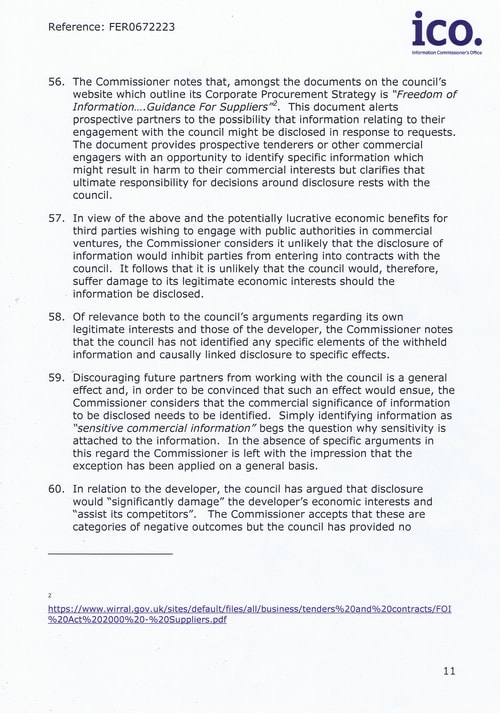
Reference: FER0672223
- The Commissioner notes that, amongst the documents on the council’s website which outline its Corporate Procurement Strategy is “Freedom of Information….Guidance for Suppliers”2. This document alerts prospective partners to the possibility that information relating to their engagement with the council might be disclosed in response to requests. The document provides prospective tenderers or other commercial engagers with an opportunity to identify specific information which might result in harm to their commercial interests but clarifies the ultimate responsibility for decisions around disclosure tests rests with the council.
- In view of the above and the potentially lucrative economic benefits for third parties wishing to engage with public authorities in commercial ventures, the Commissioner considers it unlikely that the disclosure of information would inhibit parties from entering into contracts with the council. It follows that it is unlikely that the council would, therefore, suffer damage to its legitimate economic interests should the information be disclosed.
- Of relevance both to the council’s arguments regarding its own legitimate interests and those of the developer, the Commissioner notes that the council has not identified any specific elements of the withheld information and causally linked disclosure to specific effects.
- Discouraging future partners from working with the council is a general effect and, in order to be convinced that such an effect would ensue, the Commissioner considers that the commercial significance of information to be disclosed needs to be identified. Simply identifying information as “sensitive commercial information” begs the question why sensitivity is attached to the information. In the absence of specific arguments in this regard the Commissioner is left with the impression that the exception has been applied on a general basis.
- In relation to the developer, the council has argued that disclosure would “significantly damage” the developer’ economic interests and “assist its competitors”. The Commissioner accepts that these are categories of negative outcomes but the council has provided no
2
https://www.wirral.gov.uk/sites/default/files/all/business/tenders%20and%20contracts/FOI%20Act%202000%20-%20Suppliers.pdf
11
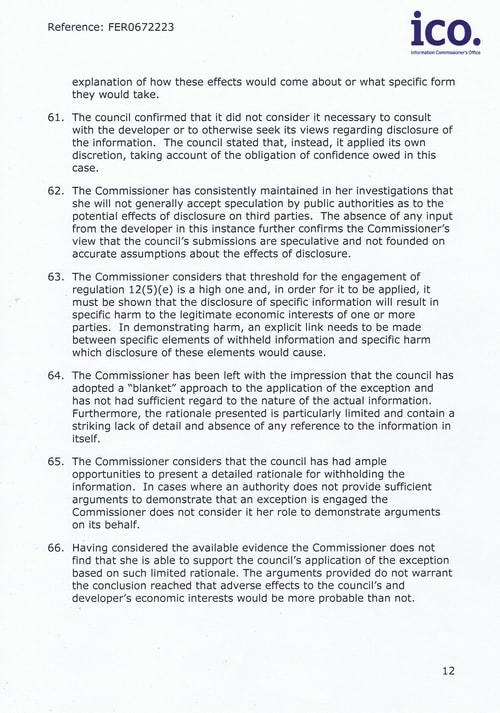
Reference: FER0672223
- explanation of how these effects would come about or what specific form they would take.
- The council confirmed that it did not consider it necessary to consult with the developer or to otherwise seek its views regarding disclosure of the information. The council stated that, instead, it applied its own discretion, taking account of the obligation of confidence owed in this case.
- The Commissioner has consistently maintained in her investigations that she will not generally accept speculation by public authorities as to the potential effects of disclosure on third parties. The absence of any input from the developer in this instance further confirms the Commissioner’s view that the council’s submissions are speculative and not founded on accurate assumptions about the effects of disclosure.
- The Commissioner considers that the threshold for the engagement of regulation 12(5)(e) is a high one and, on order for it to be applied, it must be shown that the disclosure of specific information will result in specific harm to the legitimate economic interests of one or more parties. In demonstrating harm, an explicit link needs to be made between specific elements of withheld information and specific harm which disclosure of these elements would cause.
- The Commissioner has been left with the impression that the council has adopted a “blanket” approach to the application of the exception and has not had sufficient regard to the nature of the actual information. Furthermore, the rationale presented is particularly limited and contains a striking lack of detail and absence of any reference to the information in itself.
- The Commissioner considers that the council has had ample opportunities to present a detailed rationale for withholding the information. In cases where an authority does not provide sufficient arguments to demonstrate that an exception is engaged the Commissioner does not consider it her role to demonstrate arguments on its behalf.
- Having considered the available evidence the Commissioner does not find that she is able to support the council’s application of the exception based on such limited rationale. The arguments presented do not warrant the conclusion reached that adverse effects to the council’s and developer’s economic interests would be more probable than not.
12
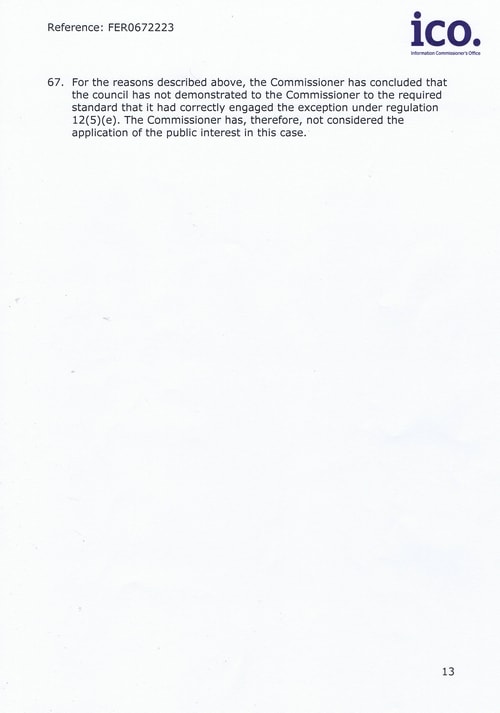
Reference: FER0672223
- For the reasons described above, the Commissioner has concluded that the council has not demonstrated to the Commissioner to the required standard that it had correctly engaged the exception under regulation 12(5)(e). The Commissioner has, therefore, not considered the application of the public interest in this case.
13
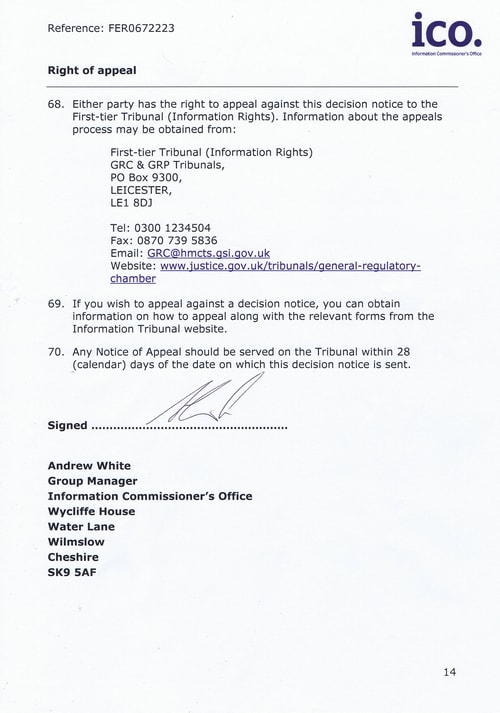
Reference: FER0672223
- Either party has the right to appeal against this decision notice to the First-tier Tribunal (Information Rights). Information about the appeals process may be obtained from:
First-tier Tribunal (Information Rights)
GRC & GRP Tribunals,
PO Box 9300,
LEICESTER,
LE1 8DJ
Tel: 0300 1234504
Fax: 0870 739 5836
Email: GRC@hmcts.gsi.gov.uk
Website: www.justice.gov.uk/tribunals/general-regulatory-chamber - If you wish to appeal against a decision notice, you can obtain information on how to appeal along with the relevant forms from the Information Tribunal website.
- Any Notice of Appeal should be served on the Tribunal within 28 (calendar) days of the date on which this decision notice is sent.
Signed …………..(signature of Andrew White)……………..
Andrew White
Group Manager
Information Commissioner’s Office
Wycliffe House
Water Lane
Wilmslow
Cheshire
SK9 5AF
14
If you click on any of the buttons below, you’ll be doing me a favour by sharing this article with other people.
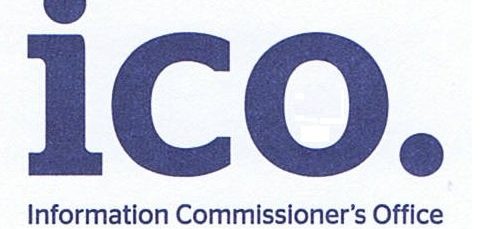
In their entire history, the blowhards at the ICO have never made an application to the High Court in the UK, in these or similar circumstances.
Don’t expect anything but powderpuff, light touch, wet blanket appeasement, masquerading as “regulation”.
Still an impressive achievement though and somebody won’t be happy where it matters in Brighton Street!
Thanks for your kind comment.
Well I’ve only known a council ignore an ICO decision notice that required them to do something once, which was decision notice FS50591795 and Liverpool City Council (who claimed at the time not to have received the decision notice).
G’day John
If Uncle Sam can’t build china town or have a two day concert how in heavens name can “Phil the Very Very Very Very Slimy, Elusive, LYING, Deluded Dill” build a golf resort.
I can feel some phoenixing coming on.
Ooroo
James
Apologies for the delay in replying to your comment James, although I had to look up what the phrase “phoenixing” meant!
It’s explained on this page far better than I could explain it.